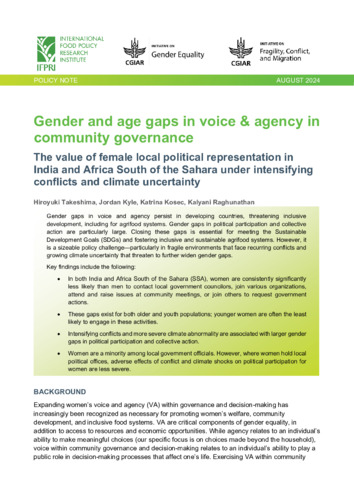Gender and age gaps in voice & agency in community governance: The value of female local political representation in India and Africa South of the Sahara under intensifying conflicts and climate uncertainty
Abstract
Expanding women’s voice and agency (VA) within governance and decision-making has increasingly been recognized as necessary for promoting women’s welfare, community development, and inclusive food systems. VA are critical components of gender equality, in addition to access to resources and economic opportunities. While agency relates to an individual’s ability to make meaningful choices (our specific focus is on choices made beyond the household), voice within community governance and decision-making relates to an individual’s ability to play a public role in decision-making processes that affect one’s life. Exercising VA within community governance and decision-making involves having a meaningful say in the public sphere. Women’s VA within communities may strengthen resilience, increase women’s access to essential resources, improve women’s decision-making power in various domains including the household, and facilitate broader social networks for women. Sustainable Development Goal five on gender equality specifically targets the full and effective participation and equal opportunities for leadership for women at all levels of political life. However, gender gaps in VA are persistent. These gaps can be further aggravated by adverse external shocks, such as climate uncertainty and conflicts, which can impact resources, capital, and economic opportunities and which are often disproportionately harmful to women.

